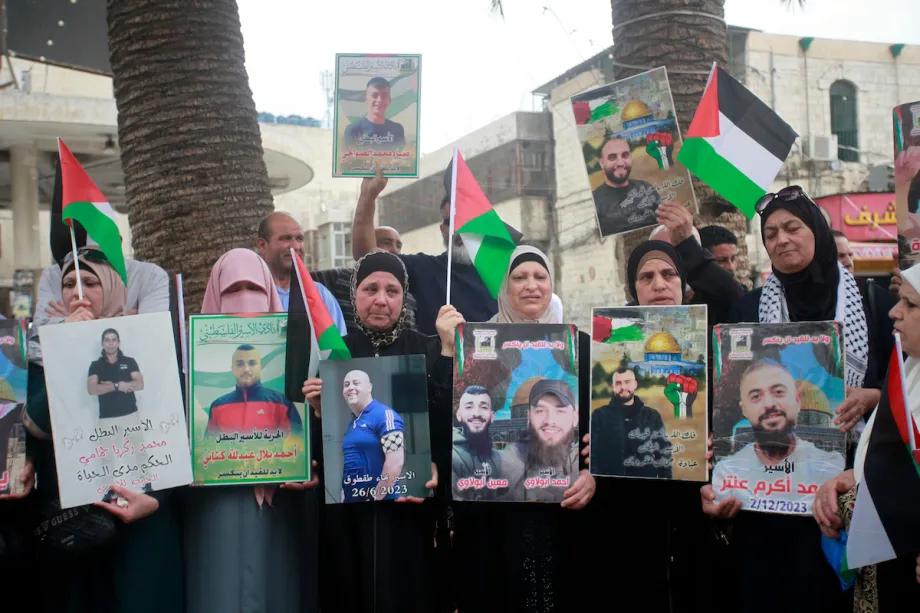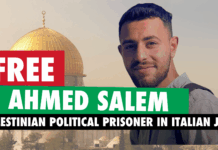
The Zionist Prisoners and the Families of Our Prisoners in the Enemy’s Jails
Khaled Barakat
The following article, by Khaled Barakat, Palestinian writer and member of the Executive Committee of the Masar Badil, the Palestinian Alternative Revolutionary Path Movement, is published especially for the Samidoun website (originally in Arabic):
From the moment the Palestinian resistance in Gaza announced the capture of a number of Zionist soldiers and settlers during the glorious Al-Aqsa Flood operation, the issue of the Zionist “hostages” became the center of global attention. Hours upon hours of television programming are devoted to it. Political pressure is exerted, tents are erected in public squares, and tears are shed for those whom the media describe as “innocent victims.”
Meanwhile, more than 10,800 Palestinian prisoners, including women and children, remain in the occupation’s cells — some for more than thirty years —without the hypocritical world so much as blinking an eye, or hearing the cries of a Palestinian mother who has waited decades for a long-delayed embrace.
The Zionist captive is presented as a wronged human being, kidnapped from among loved ones, shown through emotional family photos and touching stories broadcast night and day. Western media is diligent in feeding this narrative: the child waiting for his father, the sleepless wife, the mother who never stops crying. All this is done in complete detachment from the context of war and occupation, as if these “hostages” were not part of a military machine that destroys Gaza, besieges the Palestinians, and squats on their land.
Governments, embassies, and international organizations are mobilized to pressure the Palestinian resistance, and any attempt to demand a prisoner exchange is condemned as “humanitarian blackmail,” while the root of the crisis — the Zionist occupation and settler colonialism — is entirely ignored.
No one hears about the 73 martyrs who have died in the enemy’s prisons since October 7, 2023, or about the 10,800 Palestinian prisoners suffering in the occupation’s cells, including about 400 children, 50 women, 500 sick detainees, and some who have been imprisoned for over three decades. There is no mention of their denial of visits, medical care, and education; no mention of the children snatched from their homes at night and thrown into interrogation dungeons; no mention of the 3,600 administrative detainees held without charge or trial. There are no images of Palestinian mothers’ tears or families awaiting news from behind bars.
For the Western media machine, the Palestinian prisoner is merely a “terrorist,” not treated as a human being, and not factored into calculations of justice and conscience. The resistance’s demand for their release is painted as a moral crime, not a legitimate right.
Amid this grossly uneven struggle, the “Palestinian Authority,” along with the defeated official Arab governments, stands in a position of impotence and complicity. The Authority does nothing, save for a few hollow statements on ceremonial occasions. Its embassies practice selective deafness and deliberate muteness, taking no part in solidarity campaigns for the prisoners or in legal and political battles on the international stage. There is utter silence in the face of daily massacres and mass arrests. In fact, the Authority has reached the point of repressing popular events in solidarity with the prisoners if they dare deviate from the official line.
The security coordination with the occupation, which the Authority secretly prides itself on while publicly disavowing, is one of the direct causes of the continued and systematic arrests and the collapse of popular trust in the Authority. This cannot be excused as weakness, but must be understood within the context of a political-security function that aligns with the logic of “managing the occupation,” not resisting it, and a futile reliance on negotiations, not a struggle to liberate the prisoners.
What makes matters worse is the state of paralysis afflicting the majority of Palestinian “factions” in the West Bank. With the exception of some individual and youth-led initiatives, there is no organized movement or sustained campaign that provides platforms for the voices of prisoners’ families, exposes the realities of imprisonment, or expresses the voice of their loved ones. Active prisoner committees have disappeared. These “organizations” and so-called “human rights institutions,” which were supposed to lead the street in defense of their sons and daughters in prison, have become incapable of addressing their own constituencies, let alone the world.
While weekly marches are organized in Tel Aviv for the families of Zionist soldiers, the cities of the West Bank lack continuous actions expressing the voices of Palestinian prisoners’ mothers, fathers, spouses and children. This silence is the result of organizational decay, bureaucratic stagnation, and the political division that has torn apart the national movement.
The world’s hypocrisy is laid bare when the Zionist soldier is presented as a victim worthy of sympathy, while the Palestinian prisoner is reduced to a “security number” or accused of “terrorism.” As soon as someone hears the phrase “families of the prisoners,” they immediately imagine the families of Zionist captives in Gaza. Western media does not see the Palestinian detainees as human beings—it does not record their stories, convey their suffering, or give them a platform to speak of their suffering. In contrast, doors are thrown open for the families of Zionist soldiers in international organizations and parliaments, and they are used as political pawns to pressure the resistance.
A Palestinian mother says:
“My son has been in prison for twenty years. He grew up without me, and I grew old at his prison gate. I haven’t touched him, haven’t hugged him, I don’t know what he looks like now. Why does no one hear my cry? Am I any less of a mother than others? Or is my blood cheap because I’m Palestinian?”
But these words fall on closed ears, because their speaker belongs to the “wrong side” of the colonial equation. The world does not care, and the human rights organizations are busy counting the breaths of Zionist soldiers — not the cries of Palestinian mothers.
The experience of the resistance in Gaza has shown that the issue of prisoners is not just a negotiating file, it is a symbol of national dignity. Indeed, the cause of the prisoners and their liberation was one of the main reasons behind the glorious Al-Aqsa Flood operation. Whoever seeks equality in suffering must begin by achieving justice, and breaking the wall of silence, complicity, and hypocrisy that has surrounded us for decades.
What is needed today is not only the adoption of a balanced and humane discourse, but the forceful extraction of the prisoners’ cause and their families from the grip of marginalization, neglect, and silence—returning it to its natural and rightful place at the heart of the national liberation struggle, as a central issue.
These brave prisoners in the enemy’s jails are in fact the trusted, legitimate, and true Palestinian leadership. They are, with the armed resistance, the sole legitimate representatives of the Palestinian people and their liberation struggle. And whoever does not stand with Gaza and the valiant armed resistance will never stand for the Palestinian prisoners’ movement, which remains the first line of defense for Palestine.
Discover more from Samidoun: Palestinian Prisoner Solidarity Network
Subscribe to get the latest posts sent to your email.




